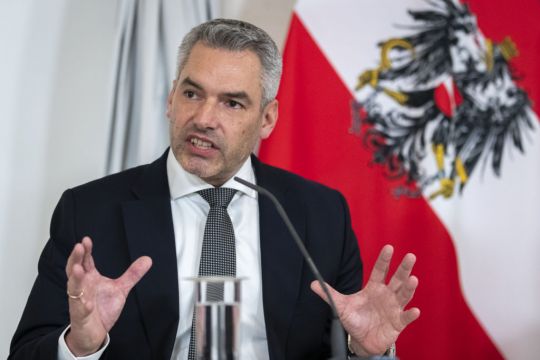Austria’s parliament has voted to introduce a Covid-19 vaccine mandate for adults from February 1, the first of its kind in Europe.
MPs voted 137 to 33 on Thursday to approve the mandate, which will apply to all residents of Austria aged 18 and over.
There will be maximum potential fines of up to 3,600 euros (£2,990) for people who do not comply after a series of reminders.
Exempted from the mandate are pregnant women, individuals who for medical reasons cannot be vaccinated, and people who have recovered from a coronavirus infection in the past six months.
Officials say the mandate is necessary because vaccination rates remain too low.
Health minister Wolfgang Mueckstein, speaking in parliament on Thursday, called the measure a “big and, for the first time, also lasting step” in Austria’s fight against the pandemic.

“This is how we can manage to escape the cycle of opening and closing, of lockdowns,” he said, saying it is about fighting not just omicron, but any future variants that might emerge.
“That is why this law is so urgently needed right now.”
The Austrian government first announced the plan for a universal vaccine mandate at the same time it imposed a since-lifted lockdown in November, and amid concern that Austria’s vaccination rate was comparatively low for western Europe.
As of Wednesday, 71.8% of the population of 8.9 million was considered fully vaccinated.
Chancellor Karl Nehammer’s governing coalition worked with two of the three opposition parties in parliament on the plan to implement the mandate.
It calls for the vaccine mandate to come into effect at the beginning of February, but enforcement will start in mid-March.

“I’m appalled, I’m stunned, I’m shaken and I’m shocked,” said far-right Freedom Party leader Herbert Kickl, calling the law “nothing more than a huge blow to the freedoms of Austrians”.
Pamela Rendi-Wagner, head of the opposition Social Democrats, said the vaccine mandate is something “that we all didn’t want” but that it “has unfortunately become necessary to close this vaccination gap that still exists in Austria”.
Once the mandate comes into effect in February, authorities will write to every household to inform them of the new rules.
From mid-March, police will start checking people’s vaccination status during routine checks; people who cannot produce proof of vaccination will be asked in writing to do so, and will be fined up to 600 euros (£498) if they do not.
If authorities judge the country’s vaccination progress still to be insufficient, Mr Nehammer said they would then send reminders to people who remain unvaccinated.
If that does not work, people would be sent a vaccination appointment and fined if they do not keep it.
Fines could reach 3,600 euros if people contest their punishment and full proceedings are opened.
Austria’s governing coalition also announced on Thursday that 1.4 billion euros (£1.16 billion) will be invested in efforts and incentives to encourage unvaccinated people to get the jab.
Of that sum, one billion euros will go toward a national vaccine lottery beginning on March 15, while the remaining 400 million euros will be directed to towns that reach a certain high vaccination rate.







